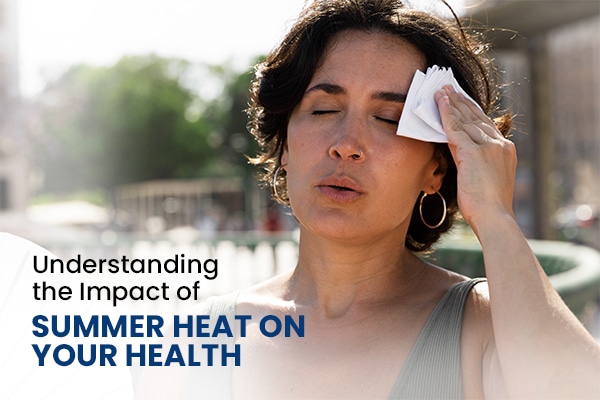As the mercury rises, so do health concerns. With temperatures reaching dizzying heights, especially in India, it’s critical to understand how summer heat can impact our well-being. Even though a significant part of the country faces high temperatures throughout the year, the overall heat intensity increases massively during the summers. People must understand the impact of heat strokes and other related factors on general health and well-being.
This blog post aims to unpack the risks of heat-related illnesses such as heat exhaustion and heatstroke, delve into the specific groups most vulnerable, including children and older adults, and provide practical tips for staying safe this summer season. Stay informed and safeguard your health against the scorching summer sun.
The Physiology of Heat and the Human Body
The human body is an exquisite machine, perfectly adapted to regulate its internal temperature. However, this internal thermostat can struggle to maintain balance during the intense summer heat. Prolonged exposure to high temperatures can lead to dehydration, heat exhaustion, or even heatstroke, as the body fails to cool itself effectively. As a result, the digestive system becomes sluggish and weaker resulting in a multitude of digestive problems.
Heat-Related Illnesses
-
Heat Exhaustion: Signs, Symptoms, and Risks
Heat exhaustion occurs when the body overheats. Common signs include heavy sweating, rapid pulse, fatigue, dizziness, nausea, and headache. If untreated, it can lead to heatstroke, a more severe condition. Hence, it is always advisable to consult a physician for such symptoms.
-
Heatstroke: Signs, Symptoms, and Risks
Heatstroke is a severe heat-related illness that requires immediate medical attention. Symptoms may include a high body temperature (above 104°F), altered mental state, nausea, and seizures. It can damage vital organs and can be fatal if not promptly treated. Besides trying the traditional ways, it is always essential to consult a doctor if an individual suffers from a heatstroke.
-
Other Heat-Related Illnesses
Other conditions include heat cramps, muscle pains or spasms, and heat rash, a skin irritation caused by excessive sweating. While less severe, they should not be ignored.
Vulnerable Groups
-
Children and the Risks of Summer Heat
Children, particularly infants, are highly vulnerable to heat-related illnesses. Their bodies generate more heat relative to their size, and they are less able to regulate their body temperature than adults. It can be quite difficult for parents and guardians to stop children from playing outside. However, they should take enough precautions to protect children from heat-related ailments.
-
Older Adults and the Risks of Summer Heat
Older adults also face increased risk. The body’s ability to adequately respond to heat can decline with age. Chronic illnesses and certain medications can also impair the body’s heat regulation.
-
Other Vulnerable Groups
Individuals with chronic illnesses, pregnant women, and those working outdoors, such as construction workers and farmers, are also susceptible to heat-related health risks.
In addition, factors like dehydration and reduced sweat production can contribute to heat-related health issues in older adults. Prolonged exposure to high temperatures can lead to heat exhaustion or even deadly heat stroke. Lack of proper hydration or access to cooling mechanisms only compounds these risks. Therefore, it is essential to ensure that older adults remain in well-ventilated, relaxed environments and are adequately hydrated during the hot summer months.
Staying Safe in the Summer Hea
-
The Importance of Hydration: When, Why, and How Much to Drink
Drinking plenty of water is critical to replace fluids lost through sweating. Aim to drink more water than usual, and don’t wait until thirsty.
-
Seeking Shade and Avoiding Peak Sun Hours
Avoid direct sun exposure, especially between 10 a.m. and 4 p.m. when the sun is most intense. When outside, seek shade under trees, umbrellas, or canopies. As per experts from the best neuro hospital in India, there might be brain-related complications due to prolonged exposure to summer heat.
-
Recognising Signs of Distress and What to Do
Watch for signs of heat-related illnesses, such as heavy sweating, weakness, dizziness, nausea, and fast heartbeat. If these occur, move to a cooler place, sip water, and seek medical attention if symptoms worsen or last longer than an hour.
-
Additional Tips
Wear lightweight, loose, and light-coloured clothing. Use a hat or umbrella to protect yourself from the sun, and always apply broad-spectrum sunscreen with a high SPF.
The Impact of Summer Heat in India
In India, the blistering summer heat poses unique challenges. Heatwaves can last for days, leading to serious health concerns. These periods of intense heat affect everyone but particularly hit hard among the poor, those living in densely populated urban areas, and outdoor workers. In response, authorities have introduced measures such as heat action plans, offering cool city spaces, and promoting awareness about heat-related risks.
In addition to these concerns, climate change has exacerbated the situation, increasing India’s frequency and intensity of heat waves. People with limited resources, especially in slums, suffer the most as they typically lack access to adequate cooling and shelter. Notably, the agricultural sector, which employs a significant portion of the population, is severely impacted as working hours are curtailed due to the excessive heat.
Moreover, the public health system often struggles to manage the surge in heat-related illnesses, adding to the already high burden on India’s healthcare infrastructure. As a result, proactive measures, like the distribution of water and ORS in heat-stricken areas, have become critical. Furthermore, public awareness campaigns around symptoms of heatstroke and heat exhaustion, and preventive measures like wearing light, loose clothes and using umbrellas or hats, are being prioritised to tackle this climatic adversity effectively.
Conclusion
Understanding the health implications of summer heat is vital. The risks are real but can be managed effectively with knowledge and precautions. Stay vigilant about the signs of heat-related illnesses, particularly among vulnerable groups. Be proactive in hydrating, seeking shade, and protecting your skin. As we face the height of summer in India, let’s keep health at the forefront, embracing preventative measures and educating others about the risks and remedies of heat-related health issues. Let’s weather the summer heat with caution and care, ensuring the sun adds life to our days, not detracts from our health.
Parul Sevashram Hospital, the
best hospital in Vadodara, successfully treats a large number of patients suffering from heat-related illnesses each summer. The experts at this hospital strongly recommend precautions to protect yourself from the scorching heat and not to ignore even the mild symptoms of such ailments.


